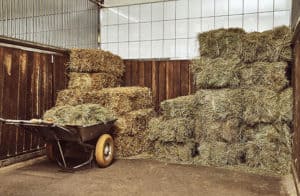
Horse Feed Storage and Preservation
Buy quality hay and grain and store it in cool, dry places to preserve nutrient content and prevent spoilage.

Buy quality hay and grain and store it in cool, dry places to preserve nutrient content and prevent spoilage.

Stacking and tarping your hay correctly can ensure quality forage for your horse all winter.

Is your hay more than 6 months old? Then it might be losing vitamin A and E.

Learn how to keep horses and humans safe by storing your supplies and equipment properly.

A veterinarian gives tips for creating your own equine facility with horse health in mind.

Consider these horse health- and safety-oriented design aspects when building or renovating your barn.

Learn how to avoid combustion and barn fire caused by your stored hay.

Tractors, breeches, and horse-themed jewelry might make up your wish list. But what would your horse ask Santa for?

Whether you run a large facility for many horses or provide a home for one or two, we’ve compiled information geared toward helping improve your day-to-day barn life and operations.

Rats and mice spread disease and ruin horse feed. Learn how to reduce populations in your barn.

Opossums are the culprits that transmit the causative parasite of EPM to horses. Dr. Dan Howe of the University of Kentucky recommends making an effort to keep them out of the barn and away from the food and water supplies.

Buying hay and feed in bulk quantities can save money up front. Find out how long you can store hay, grains, and feed.

Your feed store is having a big sale, but here are some tips before you stock up.

Here’s how to react if your horse consumes feed designed for another animal.

How do you make space for horse feed when packing for a multiday trip? Our equine nutritionist offers suggestions.

Out-of-control critters can pass along pathogens, damage property and structures, and create unhygienic messes. Find out how to deter unwanted visitors such as birds, raccoons, skunks, and other rodents on your horse farm.
Stay on top of the most recent Horse Health news with
© 2022 Copyright Statement dolor sit amet, consetetur sadipscing User Terms, sed diam nonumy eirmod tempor invidunt ut labore et dolore magna aliquyam erat, sed diam voluptua. At vero eos et accusam et justo duo dolores et ea rebum. Stet clita kasd gubergren, no sea takimata sanctus est Lorem ipsum dolor sit amet.
"*" indicates required fields